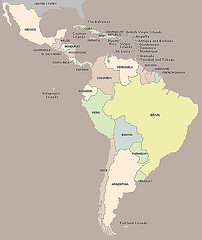Technology and Economic Development: What's the Relationship?

Earlier this week I escaped the office for a couple of hours to attend an event at the Council of the Americas, "Is Technology the Key to Development?" The event focused on a new study by the Inter-American Development Bank (IDB) that explores whether investment in ICT in Latin America has an impact on economic development. The findings: ICT alone is not the answer to economic development.
Before focusing on the implication of the findings, let’s first look at some background on the landscape and methodology of the research. Latin American and the Caribbean have seen large investments in ICT in the past decade. This investment bought with it hopes of development and growth, yet until this study very little was known on the impact ICT was having on development in the region. In order to address this gap, the IDB team conducted a this survey. The study conducted randomized controlled trials across a number of sectors (labor, education, institutions, health, finance, environment) and studied nearly 50 projects. After studying this wide variety of programs they found that in 39% of the projects the impact in ICT was strong - but in 61% of projects it was much less so. From this data and their analysis, the researchers concluded that ICT alone doesn’t work, but rather it needs to be coupled with human capital, infrastructure, and regulations in order to have a positive impact.
This is something our team particularly focuses on; often the tech tools are the least important element of our work. At the end of the day, this is a people business, and the commitment, training, and organization of partners have more to do with the success or failure of a program than the snazziness of the technology.
Examples of successful ICT projects included a project in Bolivia where switching to computers instead of typewriters increased productivity by more than one third, dramatically increasing the efficiency of issuing national ID cards. Another success from Bolivia was the use of cell phone reminders to save money; individuals who received the monthly ticklers saved 6% more than those who did not.
So what do these findings mean for ICT in development? ICT tools cannot be implemented alone; they must be one part of a holistic approach that deals with the complex nature of the problem. When attempting to ICT one needs to ensure that it can be effective given the limitations of the infrastructure in place . The findings also highlight the difference between access and use; it is important to note that just because one has access to a tool it does not not mean it will be utilized in the way the program envisioned. Access means nothing if one doesnt know how to use a tool - or if you don’t see a need for it. This study is the first of its kind, but I'm sure more such studies will be done as development practitioners, governments, and citizens attempt to quantify and understand how ICT tools are really impacting development and growth.
